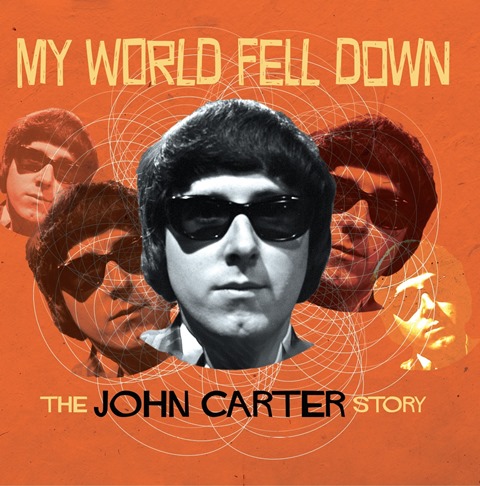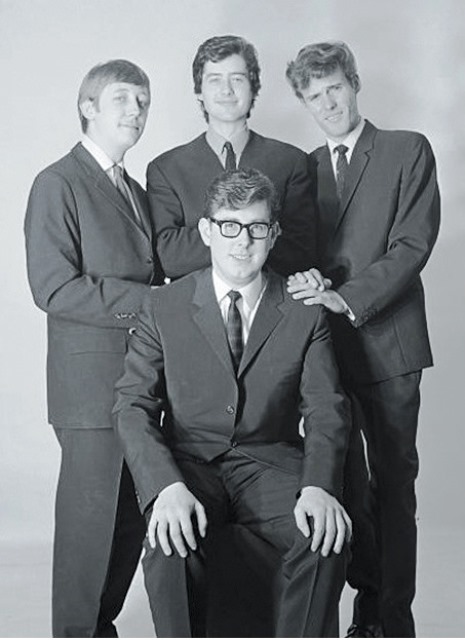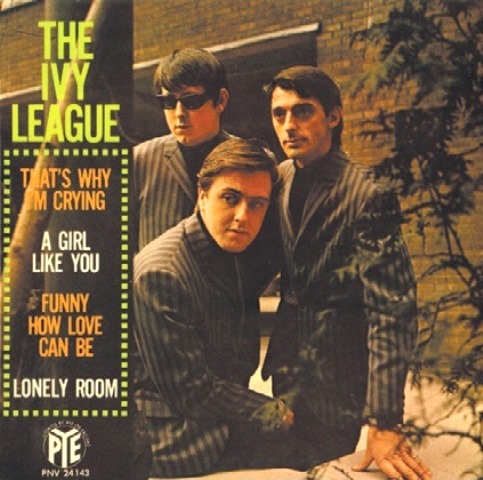Music Reissues Weekly: My World Fell Down - The John Carter Story | reviews, news & interviews
Music Reissues Weekly: My World Fell Down - The John Carter Story
Music Reissues Weekly: My World Fell Down - The John Carter Story
Extensive testament to a one-man music industry

Fat Man’s Music Festival. The Haystack. Red Line Explosion. Stormy Petrel. Butterwick. Sweet Chariot. Names which don't immediately spring to mind.
The factor linking them is also common to 1967’s “Let’s go to San Francisco” hit-makers The Flower Pot Men, The First Class, who charted in 1974 with “Beach Baby,” and The Ivy League, who went Top Ten in early 1965 with “Funny How Love Can be.”
 Then, there are well-known songs like “Hip Hip Hooray,” “Knock Knock Who’s There,” “My Sentimental Friend” and “Winchester Cathedral” which, respectively, were hits for The Troggs, Mary Hopkin, Herman’s Hermits and the New Vaudeville Band.
Then, there are well-known songs like “Hip Hip Hooray,” “Knock Knock Who’s There,” “My Sentimental Friend” and “Winchester Cathedral” which, respectively, were hits for The Troggs, Mary Hopkin, Herman’s Hermits and the New Vaudeville Band.
John Carter wrote or co-wrote all these songs and operated under the names in the first two paragraphs. The story is told by My World Fell Down - The John Carter Story, a four-CD set in a card slipcase collecting 105 tracks for which he was integral. The latest cut is a First Class single issued in November 1977. The set opens with “Back on the Scene,” May 1961’s first Carter, Lewis & The Southerners single. Lewis was his collaborator Ken Lewis and The Southerners referenced Southern Music, the music publishing company which had recognised Carter’s multi-faceted talent. Even at this early stage he was a singer and songwriter already part of the furniture of the music biz's back rooms.
Obviously, Carter’s path through the British music industry has been prodigious. In essence, the songs he’s sung and written have never strayed far from his primal influences: The Everly Brothers, The Beach Boys, Sixties harmony pop and surf music in general. The Ivy League, who became his main vehicle in summer 1964, were named for a reason: the influences were American. The various inspirational building blocks cropped up in varying proportions for different eras. From when psychedelia was hot the amazing “Blow Away”, a 1968 or 1969 demo, could pass for an outtake from The Notorious Byrd Brothers. A little earlier, the October 1966 Ivy League single track “My World Fell Down” was so thoroughly at one with (and predictive of) America’s music that – in a massive compliment – it was covered in the US by Sagittarius, a studio project initiated by former Beach Boys associate Gary Usher. Later on, Kincade’s “Dreams are Ten a Penny,” a September 1972 single, had just enough stomp for the glam-rock period.
But the reductive interpretation is too simple. John Carter’s music is about more than reactions to or sensitivities of archetypes. The craft, skill and innate love of the music gives everything on My World Fell Down a freshness which makes instant connections – even on the demo of “Hip Hip Hooray.” His creamy voice is instantly recognisable. The Carter writing style is instantly recognisable too. Set “Beach Baby” alongside “Let’s go to San Francisco” or “Dreams are Ten a Penny” and the distinctive flavour becomes plain.
 Consequently, finding a place for John Carter isn’t clear-cut. There’s some similarity with Graham Gouldman, who was likewise in a group (The Mockingbirds) and writing songs which became hits for other bands. Gouldman went on to 10cc but Carter ceased playing live while he was in The Ivy League and, since 1966, has avoided the stage. If something he recorded became a hit, a proxy outfit was needed. In public, The Flower Pot Men were session musicians and singers he collaborated with in the studio. It cut both ways: The Ivy League also worked as session singers. They sang on The Who’s “I Can’t Explain” in 1964 (this aspect of Carter’s career is mentioned in the accompanying booklet, but not heard).
Consequently, finding a place for John Carter isn’t clear-cut. There’s some similarity with Graham Gouldman, who was likewise in a group (The Mockingbirds) and writing songs which became hits for other bands. Gouldman went on to 10cc but Carter ceased playing live while he was in The Ivy League and, since 1966, has avoided the stage. If something he recorded became a hit, a proxy outfit was needed. In public, The Flower Pot Men were session musicians and singers he collaborated with in the studio. It cut both ways: The Ivy League also worked as session singers. They sang on The Who’s “I Can’t Explain” in 1964 (this aspect of Carter’s career is mentioned in the accompanying booklet, but not heard).
His significance as a British songwriter is analogous with the Tony Hatch and Jackie Trent partnership. And, indeed, he wrote many of songs with regular partners such as Russ Alquist, Ken Lewis, Peter Barnfather and Geoff Stephens. But Carter himself had the staying power. That makes an analogy with the correspondingly resilient Mickie Most – Carter has been as fond of working in the recording studio as Most. Like Most too, he was adept at recognising talent before it was well known. Jimmy Page figured regularly in the Carter, Lewis & The Southerners line-up. Ultimately, as it was with fellow sonic auteur Joe Meek, Carter occupied his own space. (pictured above left, Carter, Lewis & The Southerners in 1963 with John Carter, front, Jimmy Page, centre back)
Integral to this tale is the ability to stay contemporary. With their robust guitar chassis and Everlys harmonies, Carter, Lewis & The Southerners were in step with the times when The Beatles came along, even though they had issued a clutch of singles before “Love me do” went on sale. The Carter-Lewis March 1964 version of “Skinny Minnie” had enough of an R&B edge for it to be of a piece with emerging bands like The Rolling Stones. That perennial freshness again.
 With the reconfiguration of Carter, Lewis & The Southerners into The Ivy League in August 1964, John Carter and his companions again seamlessly moved with the times to plug into the more sophisticated side of the beat boom. Whatever the changes, they were ridden. The Flower Pot Men’s “Let’s Go To San Francisco” may have its cheeseball flower-power aspect but it was and is a breathtaking recording, and as vital a Pet Sounds-inclined creation as Sgt Pepper’s. The non-hits are as great as what charted. October 1968’s eccentric “The Laughing Man,” credited to John Carter and Russ Alquist, is extraordinary. “Eyes Of Kazan,” a German-only single from November 1971 ascribed to The London Boys, is another wonder.
With the reconfiguration of Carter, Lewis & The Southerners into The Ivy League in August 1964, John Carter and his companions again seamlessly moved with the times to plug into the more sophisticated side of the beat boom. Whatever the changes, they were ridden. The Flower Pot Men’s “Let’s Go To San Francisco” may have its cheeseball flower-power aspect but it was and is a breathtaking recording, and as vital a Pet Sounds-inclined creation as Sgt Pepper’s. The non-hits are as great as what charted. October 1968’s eccentric “The Laughing Man,” credited to John Carter and Russ Alquist, is extraordinary. “Eyes Of Kazan,” a German-only single from November 1971 ascribed to The London Boys, is another wonder.
Although the creative flow seemed unstoppable it could of course only go on for so long. After around 15 years continuously crafting music, John Carter stepped off the gas pedal. My World Fell Down tracks this remarkable man up to this point.
There have been many previous collections devoted to aspects of John Carter: to The Flower Pot Men, his songwriting demos, The Ivy League and so on. But the exhilarating My World Fell Down - The John Carter Story tackles the lot. As such, it is an indispensible history of British popular music.
- Next week: Off to Mexico’s rebajada scene with Saturno 2000 - La Rebajada de Los Sonideros 1962-1983
- More reissue reviews on theartsdesk
- Kieron Tyler’s website
Share this article
The future of Arts Journalism
You can stop theartsdesk.com closing!
We urgently need financing to survive. Our fundraising drive has thus far raised £49,000 but we need to reach £100,000 or we will be forced to close. Please contribute here: https://gofund.me/c3f6033d
And if you can forward this information to anyone who might assist, we’d be grateful.

Subscribe to theartsdesk.com
Thank you for continuing to read our work on theartsdesk.com. For unlimited access to every article in its entirety, including our archive of more than 15,000 pieces, we're asking for £5 per month or £40 per year. We feel it's a very good deal, and hope you do too.
To take a subscription now simply click here.
And if you're looking for that extra gift for a friend or family member, why not treat them to a theartsdesk.com gift subscription?
more New music
 Album: The Divine Comedy - Rainy Sunday Afternoon
Neil Hannon takes stock, and the result will certainly keep his existing crowd happy
Album: The Divine Comedy - Rainy Sunday Afternoon
Neil Hannon takes stock, and the result will certainly keep his existing crowd happy
 Music Reissues Weekly: Robyn - Robyn 20th-Anniversary Edition
Landmark Swedish pop album hits shops one more time
Music Reissues Weekly: Robyn - Robyn 20th-Anniversary Edition
Landmark Swedish pop album hits shops one more time
 Album: Twenty One Pilots - Breach
Ohio mainstream superstar duo wrap up their 10 year narrative
Album: Twenty One Pilots - Breach
Ohio mainstream superstar duo wrap up their 10 year narrative
 Album: Ed Sheeran - Play
A mound of ear displeasure to add to the global superstar's already gigantic stockpile
Album: Ed Sheeran - Play
A mound of ear displeasure to add to the global superstar's already gigantic stockpile
 Album: Motion City Soundtrack - The Same Old Wasted Wonderful World
A solid return for the emo veterans
Album: Motion City Soundtrack - The Same Old Wasted Wonderful World
A solid return for the emo veterans
 Album: Baxter Dury - Allbarone
The don diversifies into disco
Album: Baxter Dury - Allbarone
The don diversifies into disco
 Album: Yasmine Hamdan - I Remember I Forget بنسى وبتذكر
Paris-based Lebanese electronica stylist reacts to current-day world affairs
Album: Yasmine Hamdan - I Remember I Forget بنسى وبتذكر
Paris-based Lebanese electronica stylist reacts to current-day world affairs
 theartsdesk on Vinyl 92: Marianne Faithful, Crayola Lectern, UK Subs, Black Lips, Stax, Dennis Bovell and more
The biggest, best record reviews in the known universe
theartsdesk on Vinyl 92: Marianne Faithful, Crayola Lectern, UK Subs, Black Lips, Stax, Dennis Bovell and more
The biggest, best record reviews in the known universe
 Blondshell, Queen Margaret Union, Glasgow review - woozy rock with an air of nonchalance
The singer's set dripped with cool, if not always individuality
Blondshell, Queen Margaret Union, Glasgow review - woozy rock with an air of nonchalance
The singer's set dripped with cool, if not always individuality
 Music Reissues Weekly: Chiswick Records 1975-1982 - Seven Years at 45 RPM
Triple-album 50th-anniversary celebration of the mould-breaking British independent label
Music Reissues Weekly: Chiswick Records 1975-1982 - Seven Years at 45 RPM
Triple-album 50th-anniversary celebration of the mould-breaking British independent label
 Album: Josh Ritter - I Believe in You, My Honeydew
The alt-country singer's latest isn't consistent but does hit highs
Album: Josh Ritter - I Believe in You, My Honeydew
The alt-country singer's latest isn't consistent but does hit highs

Add comment